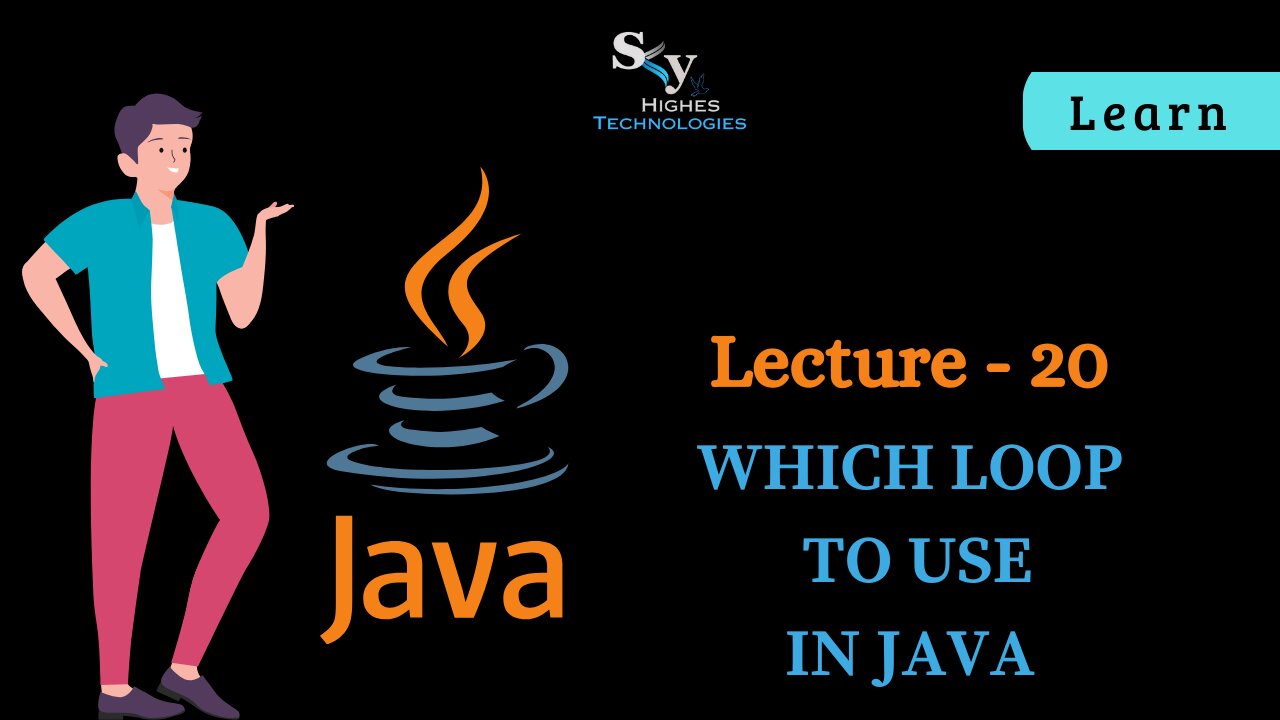Premium Only Content

#20 Which Loop to use in JAVA | Skyhighes | Lecture 20
Choosing the Right Loop in Java: A Guide to Mastering Repetition
In Java, selecting the appropriate loop for a task is like choosing the right tool for a job. Each loop has its strengths and ideal scenarios, and understanding their nuances will lead to efficient and elegant code.
Here's a guide to choosing the right loop:
1. For Loop:
Use when:
You know the exact number of repetitions needed beforehand.
You need to iterate through a sequence of values (e.g., arrays, collections).
You want concise syntax for simple, definite iterations.
Example: Printing numbers from 1 to 10:
Java
for (int i = 1; i <= 10; i++) {
System.out.println(i);
}
Use code with caution. Learn more
2. While Loop:
Use when:
You want to repeat code as long as a certain condition holds true.
The number of iterations might be unknown beforehand.
The condition depends on factors that might change within the loop.
Example: Reading user input until a specific value is entered:
Java
String input = "";
while (!input.equals("quit")) {
System.out.print("Enter text (or 'quit' to exit): ");
input = scanner.nextLine();
}
Use code with caution. Learn more
3. Do-While Loop:
Use when:
You need the code to execute at least once, even if the condition is initially false.
You want to perform initialization or input before checking the condition.
Example: Prompting the user for a valid choice:
Java
int choice = 0;
do {
System.out.print("Enter a number (1-5): ");
choice = scanner.nextInt();
} while (choice < 1 || choice > 5);
Use code with caution. Learn more
Key Considerations:
Definite vs. Indefinite Iteration: For loops are best for definite iterations, while while and do-while loops are suitable for indefinite ones.
Initial Execution: Do-while loops guarantee at least one execution, while for and while loops might not execute at all if the condition is initially false.
Syntax and Readability: For loops often offer more concise syntax, while while and do-while loops might be more readable in certain scenarios.
Remember: The best choice depends on your specific needs and coding style. Consider the following questions when selecting a loop:
Do you know the number of repetitions beforehand?
Does the loop need to execute at least once?
Is the condition dependent on factors that might change within the loop?
By carefully considering these factors, you'll confidently choose the most appropriate loop for each task, ensuring your Java code performs repetitive actions with precision and efficiency.
-
 1:23:49
1:23:49
The Officer Tatum
2 hours agoLIVE: RFK Jr. GOES OFF In Confirmation Hearing, Karoline Leavitt COOKS PRESS! + MORE | EP 50
25.8K21 -
 LIVE
LIVE
Mally_Mouse
2 hours agoLet's Yap About It - LIVE!
414 watching -
 LIVE
LIVE
ZWOGs
4 hours ago🔴LIVE IN 1440p! - Learning Heroes in Marvel Rivals, Helldivers 2, Then what? - Come Hang Out!
110 watching -
 16:38
16:38
SLS - Street League Skateboarding
7 days agoRayssa Leal's Most Clutch SLS Wins Ever! 🥶🏆
13.7K1 -
 1:53:02
1:53:02
Russell Brand
4 hours agoRFK Confirmation Battle – The Deep State is Losing Control! – SF528
132K143 -
 2:58:09
2:58:09
The Charlie Kirk Show
4 hours agoThe RFK Confirmation Hearing + Dr. Phil On A Raid | Dr. Phil, Mansdoerfer | 1.29.2025
165K39 -
 4:41:31
4:41:31
Right Side Broadcasting Network
1 day agoLIVE REPLAY: RFK Jr. Testifies at Senate Confirmation Hearing for HHS Secretary - 1/29/25
257K296 -
 28:22
28:22
Stephen Gardner
4 hours ago🔥Sen. Lindsay Graham BETRAYS TRUMP, calls for investigation!
36.7K79 -
 1:00:33
1:00:33
The Dan Bongino Show
6 hours agoTruth Returns To The White House Press Room (Ep. 2411) - 01/29/2025
678K1.5K -
 1:01:33
1:01:33
Grant Stinchfield
4 hours ago $5.51 earnedVague Details: An Effort to Avoid Panic Over Drones & "The Research"
49.2K12